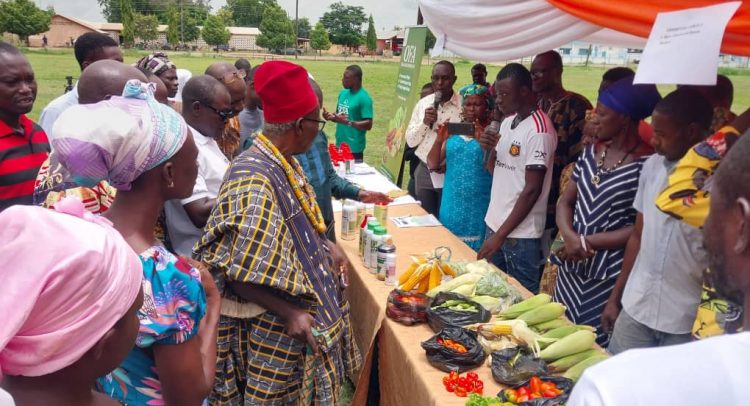Some small holder farmers undergoing training and receiving technical supports from World Vision through the Landscape and Environmental Agility across the Nation (LEAN) Project, in the Kassena-Nankana West District in the Upper East Region, say their lives would have been better if they had the opportunities the project is offering them now.
According to the farmers, lack of market opportunities and non-availability of storage facilities caused them to lose their investments through post-harvest challenges and extremely low prices quoted by market queens who take advantage of their fear of losing all their harvest.
The farmers spoke in turns with the Daily Guide at an Agriculture Market Linkage Fair at Paga in the Kassena-Nankana West District.
World Vision Ghana organized the Agriculture Market Linkage Fair as part of activities under the LEAN Project to bring other agriculture stakeholders in and out of the district aside from farmers, to get them to interact on how to improve on their various works and to connect the farmers with buyers, input suppliers, crop aggregators, and others.
The fair was aimed at farming and promoting sustainable business networks within farmers benefiting from the LEAN Project. It was also to ignite processes that will promote the growth of the agriculture sector in the district.
The Agriculture Fair brought together Agro input dealers, financial institutions, representatives of some hospitality institutions, farmer groups, crop aggregators, officials the Kassena-Nankana West Assembly, researchers from the academia as well as shoppers. Members of the farmer groups present learnt new farming techniques and technologies, as well as market trends.
The LEAN Project is a four-year project launched in 2021, and being funded by the European Union through the Global Climate Change Alliance Plus (GCCA+). The project is being implemented in Kassena-Nankana West and Damongo districts by World Vision Ghana. The LEAN Project is also being implemented in other parts of the Ghana by EcoCare Ghana, Rainforest Alliance and Tropenbos Ghana.
LEAN Project Manager at World Vision Ghana, Joseph Edwin Yelkabong, in an interview said the project is focused on ensuring sustainable agriculture practices such as climate-smart farming practices and agroforestry.
“… we have about 42 areas that we have designated as Farmer Managed Natural Regeneration sites in our operational districts where we are working to regenerate naturally. We have also nursed seedlings over the last 2 years and distributed them to farmers. In the Kassena-Nankana West District, we have distributed over 41,000 seedlings of assorted species this year.” Mr. Yelkabong revealed.
According to Mr. Yelkabong, the LEAN Project is supporting small-holder farmers in the operational districts with alternative livelihoods such as beekeeping, ruminants for rearing and fabric weaving machines to ensure that the beneficiaries do not depend on the environment for economic gains.
World Vision Ghana Regional Operations Manager for the Northern Sector, Sergious Before said there will be more Agriculture Fair to further close the gap between farmers and buyers and other players in the agriculture sector.
“One important way to increase the small holder farmers’ income is to find sustainable ways to improve on the existing value chains and to add new ones if possible. If we don’t ensure that farmers are linked properly to the market, they will end up producing only for subsistence.
We all know that better markets for farmers can lift them out of poverty and encourage more people to invest in farming.
This Agriculture Market Linkage Fair is one sure way to help promote inclusive and efficient food systems that better integrate smallholder farmers and small and medium agribusinesses into value chains that ensure growth and gains for all.”
The Kassena-Nankana West Agriculture Director, Mohammed Bukari was not happy with the situation where many financial institutions still refuse to grant loans to farmers and other players along the agriculture value chain due to perceived high risk associated with agriculture.
From: Ebo Bruce-Quansah, Paga


